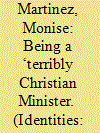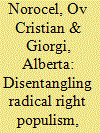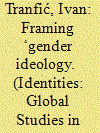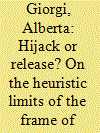|
|
|
Sort Order |
|
|
|
Items / Page
|
|
|
|
|
|
|
| Srl | Item |
| 1 |
ID:
185908


|
|
|
|
|
| Summary/Abstract |
Aiming to contribute to the debates on the entanglements among the far-right and anti-feminism Latin America, this article seeks to shed light on the performance of Damares Alves as Brazil’s Minister of Women, Family and Human Rights. Regarding Alves’s conservatism along her political career, particularly during the 2018 presidential run, this study provided an analysis on the reasons behind her prominence to the ongoing bolsonarism, and on how she contributed to building the gender knowledge that anchors the populist narrative in Bolsonaro’s political project. Concerning anti-feminist project’s foundations, as well as Alves’s performance as a Christian-conservative woman, a set of her speeches in the first 19 months of her term was scrutinised, by adopting the FCDA as methodology and using the thematic analysis as a method. The pointing of Alves’s discursive strategies revealed her attacks on feminisms, and the aim of legitimising herself and Bolsonaro’s political project as pro-women.
|
|
|
|
|
|
|
|
|
|
|
|
|
|
|
|
| 2 |
ID:
185909


|
|
|
|
|
| Summary/Abstract |
Recent research on homonationalism addresses the ideological and electoral combination of LGBTQ+ politics and radical-right populism. However, right-wing LGBTQ+ identities remain seemingly paradoxical, as right-wing Christianity-rooted conservatism is generally hostile to LGBTQ+ empowerment. Grounded in literature on populist radical right and its relationship with religion and sexuality, as well as social identity theory, we argue that right-wing LGBTQ+ people resolve identity tension by creating a positive group image. Analysing over 2,500 posts on a prominent (new/alt/populist) right-wing LGBTQ+ Reddit community, r/RightWingLGBT, we found right-wing LGBTQ+ users maintain a positive self-identity by positioning themselves against ‘degenerate, liberal, non-binary queers’, thus limiting themselves to narrow iterations of acceptable queerness which are congruent with hetero- and cis-normativity. Islam replaces Christianity as the primary anti-LGBTQ+ outgroup, which, alongside a normalisation and naturalisation of religious-rooted moral selves, helps to reconcile LGBTQ+ identities and right-wing populism and establish homonationalism as a bottom-up phenomenon.
|
|
|
|
|
|
|
|
|
|
|
|
|
|
|
|
| 3 |
ID:
185903


|
|
|
|
|
| Summary/Abstract |
This Special Issue provides diverse multidisciplinary entry points that convey the multi-layered complexity of the interactions between radical right populism, gender issues, and religious questions. It fills a gap in the scholarship dealing with the political and social manifestations of radical right populism. From a theoretical point of view, the connections between radical right populism and gender and between radical right populism and religion, respectively, have received growing scholarly attention. The present Special Issue bridges these separate lines of inquiry, concentrating on how issues of gender and religion are jointly addressed in radical right populist discourses. The articles in this Special Issue provide the first in-depth and comparative understanding of the entanglements of gender and religion in radical right populist ideology, explore the active role of religion in the populist discourse, and invite to combine the analysis of the political sphere with the analysis of occurrences in the broader society.
|
|
|
|
|
|
|
|
|
|
|
|
|
|
|
|
| 4 |
ID:
185906


|
|
|
|
|
| Summary/Abstract |
This paper explores the role of the Catholic Church in the articulation of populist discourse. By analysing the frames in Catholic doctrines and their dissemination by the Croatian clergy, I make three contributions. Firstly, in contrast to research on the populist radical right, which demonstrates the manipulation of religion committed by secular actors, I identify the Church as an influential source and producer of the populist master frame. Secondly, I demonstrate how the bridging of the ‘gender ideology’ frame to this populist master frame allows the national Church to articulate traditionalist stances on morality policies. Thirdly, I identify the local-level argumentation strategies, empowered by frame bridging with anti-communist, nationalist, and sovereignist themes typical of radical-right populism. Focusing on religious actors’ agency allows us to improve theories rooted in the secular world of populist politics that neglect churches as important sources of populist discourse and mobilisation.
|
|
|
|
|
|
|
|
|
|
|
|
|
|
|
|
| 5 |
ID:
185907


|
|
|
|
|
| Summary/Abstract |
In the Manichaean discourse of the radical-right populist parties, both religion and gender play a role in the discursive process of ‘othering’. At the same time, on some occasions, populist discourse also mobilises Christianity and gender equality against immigrants, which has been interpreted through the frames of hijacking or instrumentalization. In this paper, I advance two arguments: first, I illustrate the relevance of the literature on secularisation to finetune the analysis of the entanglements of populism, religion and gender, to overcome the ‘hijacking’ frame; second, I make a plea for a socio-constructivist perspective, which pays attention to how the actors make sense of their religious-political engagement and try to avoid paternalistic interpretations. Empirical analysis focuses on the discourse of the supporters of Matteo Salvini, the leader of the Italian radical-right populist party Lega Nord, on Instagram, showing the intersections of religion and gender.
|
|
|
|
|
|
|
|
|
|
|
|
|
|
|
|
| 6 |
ID:
185904


|
|
|
|
|
| Summary/Abstract |
We examine here how issues of gender and religion are employed for ideological purposes in the discourses of radical right populist parties in Sweden and Finland. We begin with the complexity of these societies as paragons of social welfare and gender equality, within which Lutheran Christianity discreetly underpins their largely secularised character. Employing a poststructuralist methodological approach, we analyse the key political speeches of the chairpersons of the Sweden Democrats (Sverigedemokraterna) and Finns Party (Perussuomalaiset/ Sannfinländarna). We unveil a complex interplay between gender and religion; gender equality is used strategically to strengthen and legitimise the separation between ‘the people’ and racialised Others, while references to religion are employed to rank the racialised Other as ‘less than’ the secular and modern ‘people’, and to oppose alleged inquisitorial attempts on the part of progressive left and liberal parties.
|
|
|
|
|
|
|
|
|
|
|
|
|
|
|
|
| 7 |
ID:
185905


|
|
|
|
|
| Summary/Abstract |
The Austrian Parliament has passed three laws since 2018 that prohibit wearing Muslim body-coverings in public. This departure from a formerly tolerant approach is an outcome of ongoing anti-Muslim campaigns by the radical-right populist Freedom Party of Austria (FPÖ). The party has been mobilising since the mid-1980s through the creation of two antagonisms: ‘the elite’ and second against ‘Others’ – mainly migrants. Since the turn of the century, this anti-migrant mobilisation has targeted the intersection of gender and religion by focusing on veiled Muslim women. Targeting this intersection of gender and religion, the article applies a critical frame analysis of 19 FPÖ documents from 2006 to 2020 on restrictive rulings about female Muslim body-covering. It finds that Austrian radical right populist campaigns emphasise the female body and construct the Austrian ‘people’ (biopolitics), while necropower constructs Muslim migrants as non-belonging, excludable, and erasable.
|
|
|
|
|
|
|
|
|
|
|
|
|
|
|
|
| 8 |
ID:
185910


|
|
|
|
|
| Summary/Abstract |
In this article, we comparatively analyse radical right-wing parties’ intervention into the veil debate in Turkey, Sweden, and France which are characterised by different understandings of legal and normative secularism. We explore the intersection of gender and religion in the dynamic formation of populist categories and how they can be mobilised differently along the vertical and the horizontal axes by the example of the veil. In all three countries we have analysed capitalise on gender, religiosity and secularity, and the veil is exploited in drawing boundaries between the People and non-People but also between the People and the Elites. In this way, the meanings attributed to the veil are used as a mechanism of exclusion and of drawing the boundaries through gendered narratives of who belongs to the People.
|
|
|
|
|
|
|
|
|
|
|
|
|
|
|
|
|
|
|
|
|